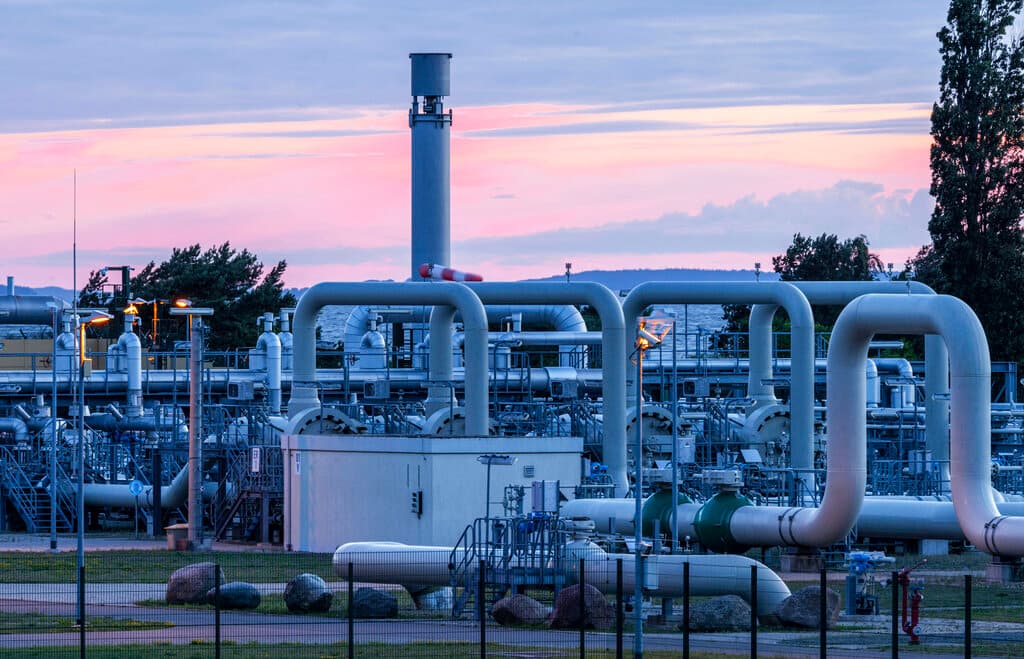Russia Shuts Down Gas Pipeline to Germany, Portending Energy Shortages Across Europe
German officials are suspicious about Russia’s intentions, particularly after Gazprom last month reduced the gas flow through Nord Stream 1 by 60 percent.

Now that Russia has turned off the gas to Europe for 10 days of scheduled annual maintenance, the big question on the Continent is whether Moscow will turn it back on.
From Berlin to Brussels and many other European capitals, concerns are mounting that Russia may not again allow the gas to flow. With other ingredients for a recession already lining up, that could prove to be the spark that sets off a Europe-wide economic slide downward.
The Nord Stream 1 pipeline, Germany’s main source of Russian gas, is scheduled to be out of action until July 21 for routine work that the operator says includes “testing of mechanical elements and automation systems.” The operator’s data showed the gas flow dropping as planned on Monday morning.
German officials are suspicious about Russia’s intentions, particularly after Gazprom last month reduced the gas flow through Nord Stream 1 by 60 percent. Gazprom cited technical problems involving a gas turbine powering a compressor station that partner Siemens Energy sent to Canada for overhaul and couldn’t be returned because of sanctions imposed over Russia’s invasion of Ukraine.
Canada said over the weekend that it would allow the part to be delivered to Germany, citing the “very significant hardship” that the German economy would suffer without a sufficient gas supply.
German politicians have dismissed Russia’s technical explanation for last month’s reduction in gas flows through Nord Stream 1, saying the decision was a political gambit to sow uncertainty and push up prices.
The German vice chancellor, Robert Habeck, has said he suspects that Russia may cite “some little technical detail” as a reason not to resume gas deliveries through the pipeline after this month’s maintenance. Tellingly, the head of Germany’s network regulator, the Bundesnetzagentur, said “no one can say exactly” whether the gas will be switched back on.
“We have very varied signals from Russia,” Klaus Mueller told ZDF television. “There are Kremlin spokespeople who say that, in combination with the Siemens turbine, they can deliver significantly more again; but there have also been very martial messages from the Kremlin.”
On Sunday, Ukraine’s energy and foreign ministries said in a joint statement that the return of Nord Stream 1 turbines “is adjusting the sanctions regime to the whims of Russia.”
Germany and the rest of Europe are scrambling to deal with the gas storage in time for winter and reduce their dependence on Russian energy imports. Germany has been getting about 35 percent of its gas to power industry and generate electricity from Russia.
Last month, Mr. Habeck activated the second phase of Germany’s three-stage emergency plan for natural gas supplies, warning that Europe’s biggest economy faced a “crisis” and storage targets for the winter were at risk.
There is concern in other countries as well over the implications of recent reductions in Russian supplies via Nord Stream 1 and other routes.
The French economy and finance minister, Bruno Le Maire, said over the weekend that a complete halt to Russian gas supplies is a “credible possibility.” He said France has to get in “battle mode” this summer to prepare for winter, when “we will have to make courageous choices” amid likely energy shortages.
“We will not be able to keep ourselves warm and act as if nothing has changed,” Le Maire said. “We have to plan and organize now, we have to change our habits” and reduce energy consumption.
Separately, an Italian energy company, ENI, said Gazprom was cutting its Monday gas delivery by about a third compared with the average in recent days. ENI said in a statement that Gazprom would provide 21 million cubic meters of gas, compared with an average of about 32 million cubic meters.
Greece, meanwhile, gets 40 percent of its natural gas supply from Russia. As Moscow turned off the spigot today, the leading Greek newspaper, Kathimerini, reported that “there is no fuel combination that can supply all of the nation’s electricity needs without gas. Simply put, Greece won’t have electricity if there isn’t enough gas available.”
